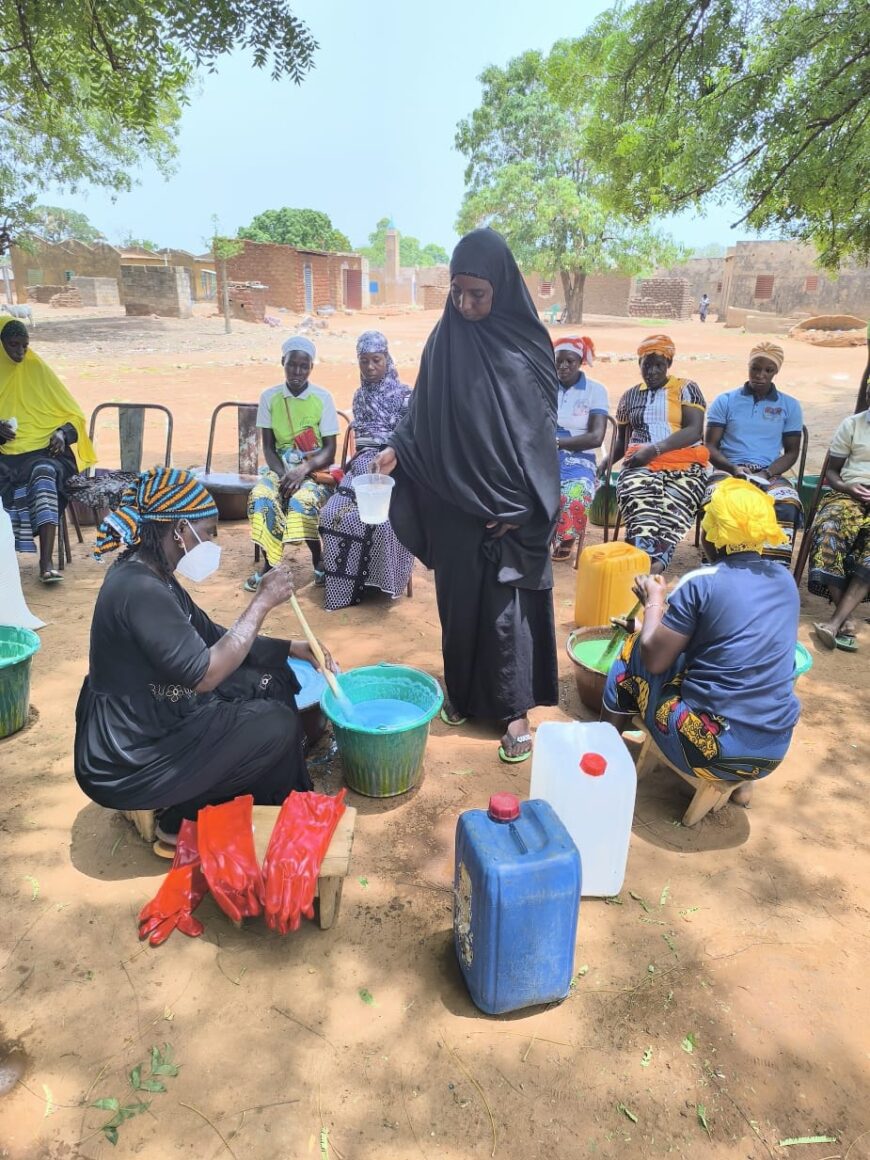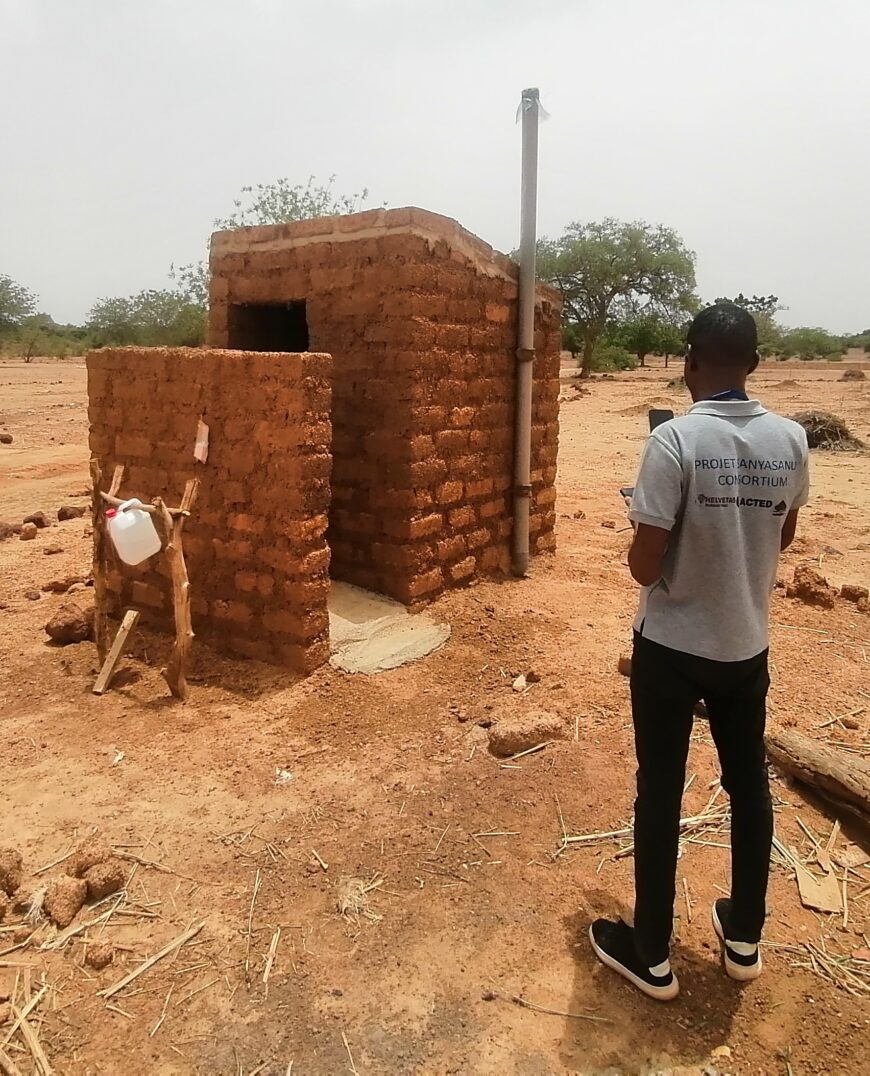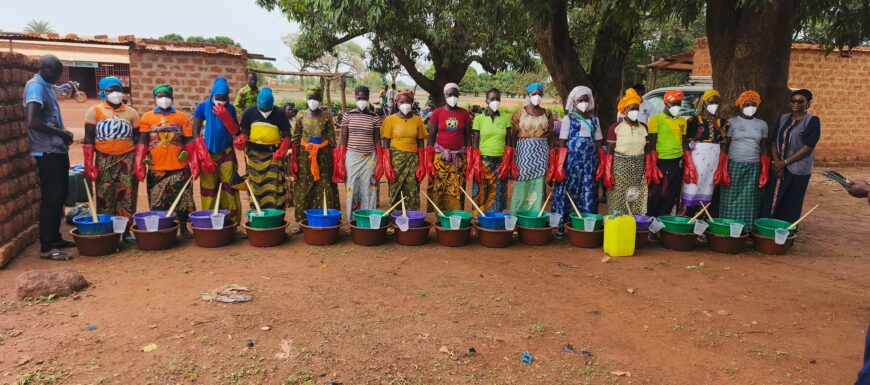Since 2016, Burkina Faso has been subject to security instability that has impacted social and economic development in several regions of the country. More than two million people have had to leave their homes and are now registered as internally displaced persons (IDPs), hosted in other communities. This situation, combined with the sometimes inadequate medical services and infrastructures, has an impact on the hygiene of the population, exposing them to increased risks of disease and heightening their vulnerability.
In Burkina Faso, the humanitarian situation remains worrying in several regions of the country due to the security context. Populations are facing major challenges in terms of access to hygiene and sanitation services. More than half of the Internally Displaced Persons (IDPs) who settle in large cities do not have access to safe latrines. Women have to walk several kilometers in search of water, and are therefore particularly vulnerable, exposing themselves to the risks of Gender-Based Violence (GBV) in insecure areas. In its report published in June 2024, the National Water, Hygiene and Sanitation Cluster (EHA) states that of the nearly 2,005,040 people who needed water, hygiene and sanitation assistance in 2023 in the North, Centre-North, Centre, Plateau Central, East, Centre-East, Boucle du Mouhoun and Hauts Bassins regions where the project operates, only 703,586 were reached.
Since 2022, the SanyaSanu project, which means “the path to cleanliness” (Sanya means “cleanliness” in Dioula and Sanu means “path” or “way” in Gourmantché), has been implementing appropriate solutions to strengthen the resilience of local communities and promote sustainable stability in these fragile regions.
The project implemented by Helvetas, Tin-tua and Acted, and supported by the Danish Embassy, aims to empower local people to manage their own hygiene and sanitation conditions, while building their capacity to adopt good practices. As part of this response, sustainable local solutions are promoted to ensure the long-term viability of actions.
Hygiene to protect the vulnerable
The SanyaSanu project provides access to sanitation infrastructure in several regions of the country, including the North, Centre Nord, Centre, Hauts Bassins, Plateau Central, East, Centre-Est and Boucle du Mouhoun. As of November 2024, some 5069 family latrines and 443 institutional latrine cabins have been built or rehabilitated for vulnerable households, health centers and schools. (Watch the video)
These latrines include hand-washing facilities, which play an important role in preventing infection and protecting people from water-borne diseases such as cholera and diarrhoea, which are exacerbated by precarious living conditions.
To ensure the efficient use of latrines, SanyaSanu undertakes community awareness-raising activities in the villages. Information sessions are organised on the importance of hygiene and sanitation, latrine maintenance, menstrual hygiene management and the advantages of using latrines over open defecation. These aspects of protection are all the more important for the most vulnerable people in communities, who have no financial means to pay for health care in the event of illness.
As the protection of women and children is essential in the context of a humanitarian crisis, SanyaSanu teams have mobilised and trained women leaders to manufacture reusable sanitary towels in the villages. Through their commitment and contribution, these women have a positive impact on social change in their communities, and are able to influence and support local communities. This initiative has facilitated access to low-cost menstrual products, enabling the maintenance of good health and well-being for vulnerable people, particularly girls and young women. SanyaSanu’s response to the diversity of community needs in terms of hygiene combines the construction of sanitary infrastructures and the promotion of local skills, thus ensuring a lasting impact on public health and the empowerment of women in the intervention regions.
Promoting community hygiene by developing the saponification skills of women leaders
To strengthen the community hygiene response, SanyaSanu has set up a training program for women in liquid soap production. In collaboration with the relevant decentralised state technical services, and community leaders, some 915 women leaders from different villages have been trained in saponification, and are taking on the role of community relay in their respective villages. SanyaSanu pays particular attention to coordination with other humanitarian actors, and ensures that communities are involved as much as possible in the implementation of projects, thus promoting acceptance of initiatives and enabling the response to be better adapted to the real needs of the populations concerned.
The various training sessions take place in each intervention village. A theoretical phase consists in explaining the importance of liquid soap and its role in promoting hygiene and sanitation in the community; then, practical training is applied, at the end of which the women actually produce the liquid soap, thanks to essential starter kits consisting of a basin, a bucket, a cup and a wooden spatula. The various basic products used in the production process are also supplied by SanyaSanu.
The soap produced is resold at an affordable price to the whole community, thus promoting the application and maintenance of good hygiene practices within families, particularly in the context of household activities, hand washing before meals and after using the toilet, and at the same time creating a source of income for women producers.
“The profits from liquid soap production enable me to pay for my children’s schooling and to buy new production equipment”, says Aicha (not her real name), originally from Sika and currently displaced in Kougsabla. She is a woman leader who has benefited from training in saponification (Watch the video). Through this activity, Aicha is satisfied with her commitment to the well-being of her community.
I'm really happy to contribute to the sanitation of this village and the surrounding villages through the production of liquid soap.

Tippy tap devices at the heart of hygiene and community health promotion
To further strengthen community hygiene, the introduction of Tippy Tap devices as part of the SanyaSanu project is a particularly innovative and effective solution in areas where access to water is limited.
The Tippy Tap is a hand-washing device designed to promote hygiene and public health in communities where water infrastructures are inadequate.
Thanks to its pedal system (see photo), it enables hands to be washed with soap and water without direct contact with the container, thus avoiding any contamination, while saving the volume of water used. SanyaSanu is thus improving hygiene conditions in families, schools and health centers in almost 525 villages, where this innovation is bringing significant improvements in hygiene and public health.

The lack of running water and the poor management of sanitation in the context of the humanitarian crisis expose the populations of these villages to health risks such as the transmission of diseases like cholera, diarrhea, dysentery and COVID. To provide a sustainable response, SanyaSanu is setting up Village Sanitation Committees, whose members are chosen by the community at a general assembly held in each intervention village, under the supervision of the project’s Water, Hygiene and Sanitation (WASH) technical team. They then organise information and awareness-raising sessions on the importance and role of Tippy Tap devices in the application and maintenance of good hygiene practices. A Tippy Tap kit is also offered to each household that has received a latrine, and the Village Sanitation Committees help them to install the devices in an easily accessible location, such as near toilets or kitchens.
By June 2024, there were almost 5647 Tippy Tap hand-washing devices in place in the 525 villages, helping to protect vulnerable people by providing an effective means of ensuring hand hygiene. Its ease of use, for adults and children alike, and its playfulness make it easy to use on a daily basis, helping to improve the health of family members.
Improving hygiene and sanitation services through the Human Rights Based Approach (HRBA)
The United Nations Sustainable Development Group defines the human rights-based approach as a conceptual framework applied to the human development process, with international human rights requirements as its normative basis and the promotion and protection of human rights as its operational objective. Complementing hygiene initiatives, this approach enables sustainable improvements to be made to hygiene and sanitation services, ensuring that every individual has equitable access to these essential services.
So, to go even further and engage all stakeholders in hygiene and sanitation issues, from the communities themselves to the highest authorities, SanyaSanu applies the Human Rights Based Approach (HRBA) in collaboration with local authorities, to ensure that hygiene and sanitation services are accessible to all and in line with the principles of human dignity, equality and justice. To this end, training sessions have been set up to reinforce the knowledge of local officials on the fundamental principles applied to the human rights to water and sanitation, and the analysis of inequalities applied to this field. These sessions reinforce the skills of the players concerned to act more effectively to ensure the human rights to water, hygiene and sanitation for all citizens. Taking into account the principles of participation, non-discrimination and transparency, local players implement awareness-raising programs on the importance of hygiene and sanitation, while collaborating with humanitarian and local organisations. These actors are committed to putting the AFDH into practice, ensuring that every individual, regardless of socio-economic status or physical ability, benefits from safe and affordable hygiene and sanitation services throughout the communal territory.
This approach guarantees protection for all social strata. Promoting the same rights to all citizens is an opportunity to ensure that people who have fled their localities are accepted and have access to a living environment that respects their dignity and ensures their protection. Collaboration and solidarity in solving hygiene and sanitation problems help to strengthen social cohesion, creating more resilient and inclusive communities in the face of health and environmental challenges.
The SanyaSanu project, supported by the Danish Embassy, responds to the critical needs of vulnerable populations in Burkina Faso through an integrated approach focused on hygiene. SanyaSanu has adapted its intervention to take account of specific vulnerabilities, particularly those of women, and to integrate environmental issues, thus maximising its impact on local communities.

The SanyaSanu project, supported by the Danish Embassy in Bukina Faso, addresses the critical needs of vulnerable populations in Burkina Faso through an integrated approach focused on hygiene. SanyaSanu has adapted its intervention to take account of specific vulnerabilities, particularly those of women, and to integrate environmental issues, thus maximising its impact on local communities.